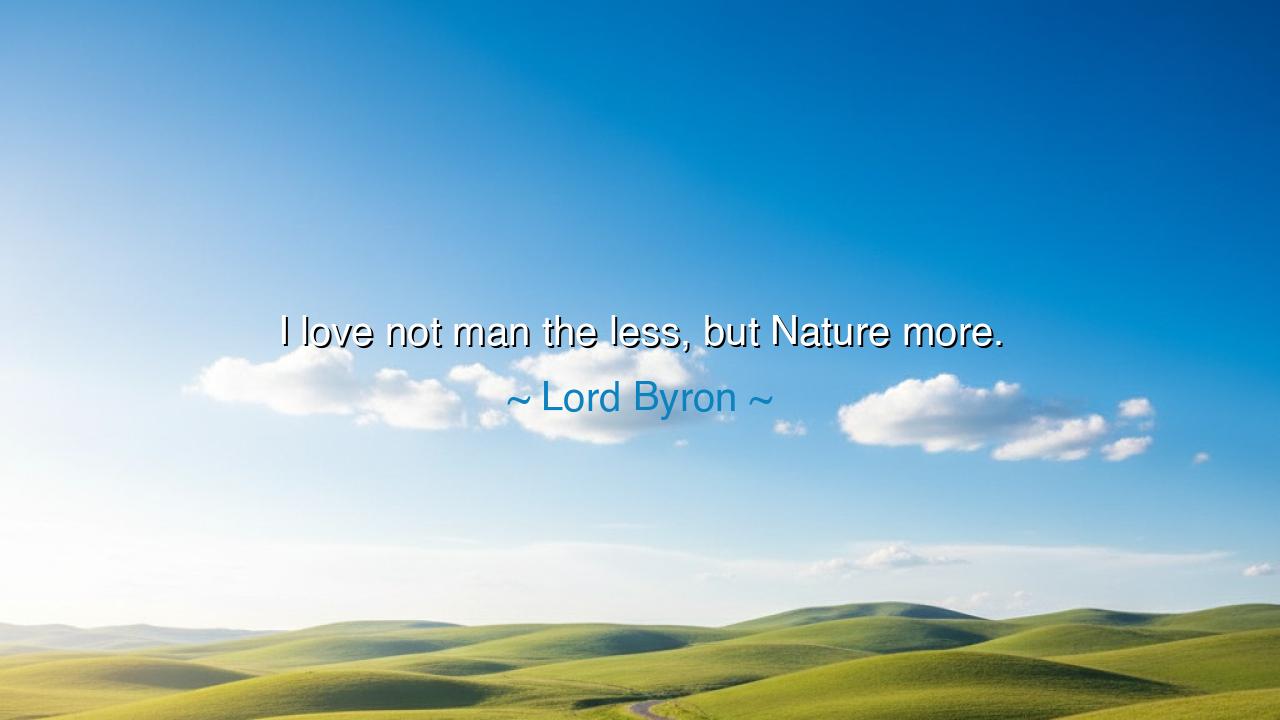
I love not man the less, but Nature more.






Lord Byron once wrote: “I love not man the less, but Nature more.” These words, drawn from his poem Childe Harold’s Pilgrimage, are among the most enduring expressions of the Romantic spirit. In them, we hear not the rejection of humanity, but the confession of a soul that finds in Nature something purer, deeper, and more eternal than in the society of men. Byron, who knew the tumult of human ambition, betrayal, and frailty, turned his heart toward the mountains, seas, and skies, where truth seemed uncorrupted and beauty eternal.
The origin of this line lies in Byron’s travels, his life of exile, and his profound communion with wild landscapes. Unlike many who praised gardens or ordered parks, Byron loved the untamed: the storm upon the sea, the solitude of mountains, the silence of vast plains. In such places, he felt both small and infinite, humbled and exalted. Thus, when he declared his love for Nature, it was not a dismissal of mankind, but a recognition that in the grandeur of the earth, he found a companionship more faithful than that offered by courts, cities, and fickle society.
The ancients understood this longing as well. The Stoics sought harmony with Nature, believing that to live according to its law was the path to wisdom. The poets of Greece sang of rivers and forests as sacred beings, guardians of truth older than man. In Eastern tradition too, sages like Laozi taught that the Tao flowed through mountains and streams, that wisdom was found not in human noise but in the quiet rhythm of the earth. Byron, though a modern poet, joined this chorus of ancient voices when he confessed that his truest love was not found in men but in Nature.
History offers us examples of this same turning of the heart. Consider Henry David Thoreau, who withdrew to Walden Pond to live simply and deliberately. He, too, loved not man the less, but Nature more, finding in the silence of the woods a truth society could not give. Or think of John Muir, who roamed the Sierra Nevada and declared that the mountains were cathedrals, filled with sermons older and more powerful than any spoken by man. These figures, like Byron, show us that to love Nature more is not to despise humanity, but to seek balance, to restore what is lost in the noise of civilization.
The meaning of Byron’s words is also deeply personal. They remind us that human love, though powerful, is often burdened with expectation, jealousy, and strife. Nature’s love asks nothing in return. The sea does not demand praise, the mountain does not grow weary of our flaws, the forest does not betray. In loving Nature, Byron embraced a relationship that was at once humbling and freeing—a bond where man is not master but participant, not ruler but child.
The lesson for us is clear: we must turn our eyes more often toward Nature, not in rejection of humanity, but in remembrance of what sustains us. In the wild we rediscover simplicity, humility, and awe. In the silence of woods or the vastness of the sea, we are reminded that our struggles are small against eternity, yet our souls are vast enough to hold eternity within. To love Nature more is to heal, to center, and to awaken.
In practice, this means seeking time away from the noise of our lives. Walk among trees. Listen to the waves. Watch the stars in silence. In these moments, love for mankind may even grow stronger, for the heart refreshed by Nature finds patience, compassion, and perspective. By loving Nature more, we learn to love man more wisely, more gently, without the blindness of pride.
Therefore, remember Byron’s wisdom: “I love not man the less, but Nature more.” These words call us not to abandon humanity, but to return to the eternal teacher—the earth itself. For in the embrace of Nature, we find strength to endure, wisdom to guide us, and love renewed for both the world and those who walk within it.






AAdministratorAdministrator
Welcome, honored guests. Please leave a comment, we will respond soon